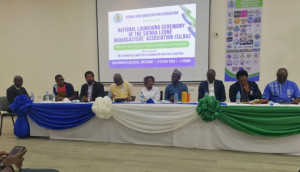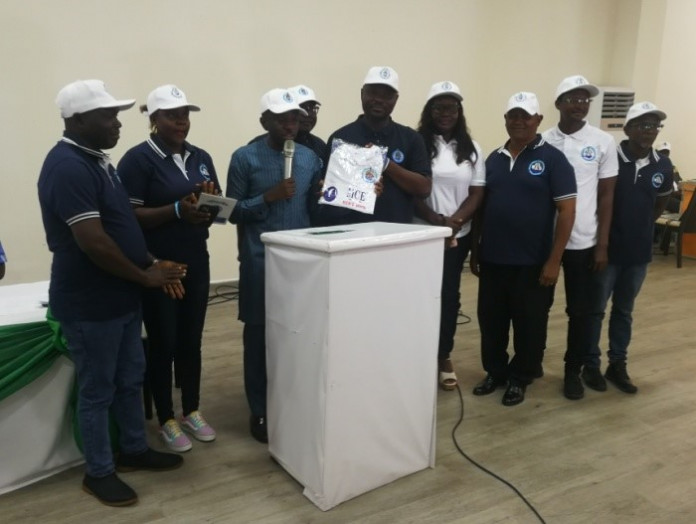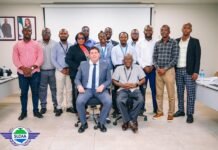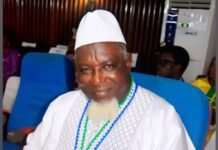By Alvin Lansana Kargbo
In a significant event held on Thursday, July 4, 2024, the Sierra Leone Broadcasters’ Association (SiLBA) was officially launched at the New Brookfield Hotel in Freetown. This new association aims to foster unity, professionalism, cooperation and best practices among broadcasters across the country.
Stanley Bangura Junior, Chairman of SiLBA, opened the event with a heartfelt welcome to all attendees, including distinguished guests such as Umaru Fofana, BBC Correspondent and the Minister of Information and Civic Education, Chernoh Bah.
In his welcome statement, he highlighted the historical significance of the event and SiLBA’s mission to create an inclusive, competitive and sustainable media environment in Sierra Leone.
The Chairman explained that SiLBA is a non-profit organization incorporated in Sierra Leone two years ago at the Corporate Affairs Commission adding that the Association was created to fill the gap for a vibrant national umbrella organization for broadcasters, safeguarding their rights, collective interests, welfare and improving their professional well-being and outputs. At its inception, SiLBA is comprised of over 50 radio and TV stations.
In his keynote address, Minister of Information and Civic Education, Chernoh Bah, discussed the significant role of the broadcasting sector in public information and civic education. He emphasized broadcasting’s resilience and enduring power, particularly radio, which remains a primary source of information for over 80% of the population. The Minister stated that despite technological advancements, radio has maintained its potency as a trusted medium for disseminating information, especially during times of chaos, such as the war.
He addressed the challenges faced by the broadcasting sector, particularly the high operating costs required to keep stations running highlighting how many stations operate out of a sense of duty and commitment to providing information despite limited resources.
Chernor Bah mentioned Government’s efforts to support community radio stations with sustainable energy solutions, such as solar power, to ensure their viability and continuous operation. Partnerships with organizations like the World Bank are being explored to implement these sustainable energy projects, the Minister said.
He also emphasized the need for a shift in the media landscape, suggesting that successful media organizations are often run as businesses by businessmen who hire journalists, rather than being owned and operated by journalists themselves.
The Minister pointed out that business expertise is essential for media viability in the 21st century additionally mentioning the Government’s commitment to reducing internet costs and improving internet connectivity, which will have a transformative impact on various sectors, including broadcasting.
Ahmed Sahid Nasralla, President of the Sierra Leone Association of Journalists (SLAJ), welcomed SiLBA to the media industry and discussed the complexities and challenges faced in the media landscape. He emphasized the importance of collective efforts and collaboration within the media community to address those challenges. The SLAJ President highlighted the need for an inclusive space that welcomes everyone, allowing diverse voices to pursue their interests and make a significant impact.
Ahmed Nasralla acknowledged the initial efforts to bring people together, gather observations and hold meetings to understand the issues better. These efforts, he said, have led to a stronger collective impact over time stressing how the media should aim to be large and independent, focusing on public education, training and building context for various activities.
He also touched on the necessity of media organizations being available to support the media landscape and the need to address problems internally within the media sector. Reflecting on persistent issues in the media over the past decades, he underscored the importance of addressing them systematically.
Bailor Kamara, representing the Independent Media Commission, expressed profound honor and joy in witnessing the launch of SiLBA, recognizing it as a significant milestone in the nation’s media landscape. He extended heartfelt congratulations to all who contributed to making this decision a reality, acknowledging their efforts as both recognized and deeply appreciated. He stated that the Independent Media Commission remains committed to ensuring that the media operates free from undue influence and interference.
Estina Taylor, representing the Women in Media Sierra Leone (WiMSAL), emphasized the importance of the broadcast media in Sierra Leone, noting its longstanding role in informing, educating and entertaining citizens across both urban and rural areas. She highlighted the significant contributions of organizations like the BBC Media Action in researching and supporting the media landscape. Estina Taylor acknowledged the challenges faced by the print media, which is in a declining stag, and contrasted that with the broadcast media, which is in a mature stage that requires adaptation to rapid technological changes and financial sustainability.
Theo Harding, Chairman of the Guild of Newspaper Editors, expressed excitement about the launch and mentioned their involvement with the Guild of Newspaper Editors. He recalled their start in journalism within the broadcast sector before transitioning to print media, emphasizing the significant role broadcast media plays in their field. The Guild Chairman expressed enthusiasm about the collaborative efforts and the formation of a broadcast association that will work closely with the guild. He appreciated the opportunity to be part of this association and anticipated positive outcomes from the partnership.
Edward Kargbo, representing BBC Media Action, expressed gratitude for the opportunity to participate in the launch of SiLBA, emphasizing the organization’s commitment to media development and transformation. He highlighted the importance of collaboration and partnerships within the media sector to achieve sustainability and development goals. He congratulated all broadcasters involved under the umbrella of this initiative, noting the value placed on partnership and collaboration by BBC Media Action.
Augustine James, representing the Media Reform Coordinating Group (MRCG), discussed various developments and objectives related to media groups and professionals in the media strategy field. He assured the membership of SiLBA that they are open to partnerships and collaborations also expressing a willingness to work together to tackle the issues faced by the media sector. His closing remarks reflected a commitment to improving conditions within the media industry through joint efforts and cooperation.
The launch of SiLBA marks a significant milestone in the nation’s media landscape, with a collective commitment to improving broadcasting standards, advocating for the rights and welfare of broadcasters and ensuring a free and responsible media environment. The Association’s establishment signifies a new era of collaboration and professionalism in the broadcasting sector of Sierra Leone.





